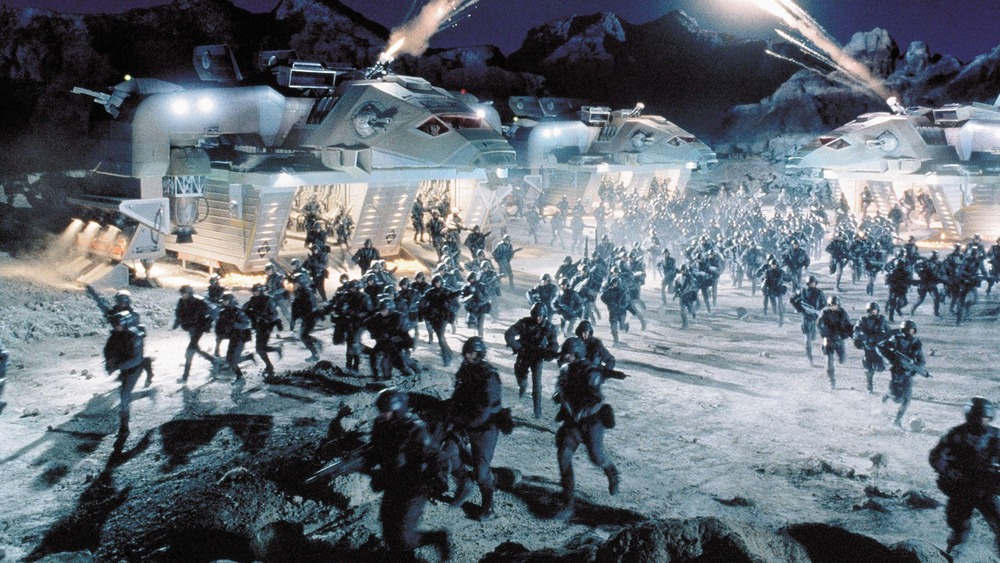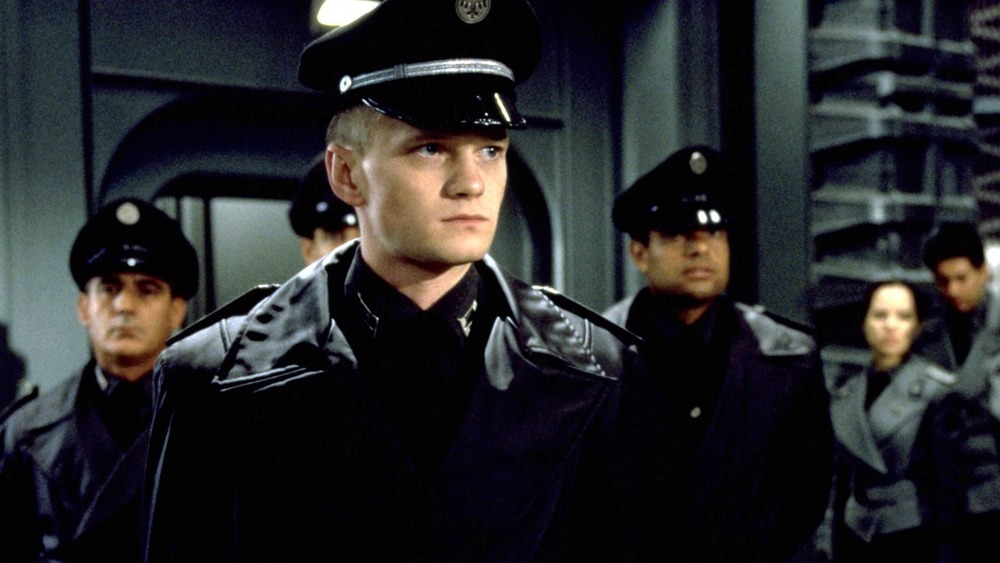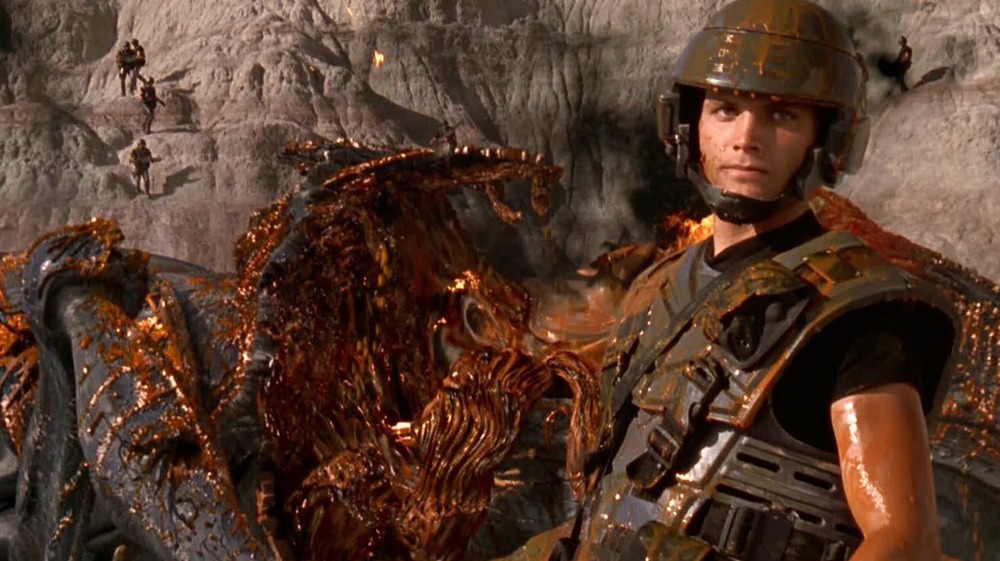The Nazi Germany Connection To Starship Troopers Everyone Ignores
If you think 1997's Starship Troopers was just a fun action movie about soldiers shooting up alien bugs ... well, to be blunt, you don't understand Starship Troopers. And the film's overt linking between Nazi Germany and U.S. nationalism only grows more disturbingly relevant every year.
Of course, Paul Verhoeven's film — inspired by the 1959 Robert Heinlein novel — isn't his only major work to be frequently misunderstood. Most of his famous movies, from Robocop to Total Recall, may look and sound like bombastic sci-fi action flicks, but are actually scathing satires, using speculative fiction tropes to criticize American excess and capitalism.
In Starship Troopers, his target is not giant corporations, but U.S. militarism. And while Starship Troopers actively seeks to rouse the audience into a patriotic fervor, through square-jawed heroes saving the day in big, "heroic" moments, it does so only to twist the knife in — because none of the brainwashed soldiers, commanders, or various political figures in the United Citizen Federation are heroes. They're fascists. In fact, Verhoeven's whole point was to draw a stark comparison between nationalism in the U.S., and nationalism in Nazi Germany.
In a 2016 interview, via IndieWire, Verhoeven explained that he wanted to "seduce the audience" through cliche depictions of jingoism, while slowly building up the uncomfortable (but never directly stated) truth that these characters, their society, and their actions were deeply sinister, from the structure of their civilization to the dehumanization of the alien bugs: "Our philosophy was really different [from Heinlein's book],we wanted to do a double story, a really wonderful adventure story about these young boys and girls fighting, but we also wanted to show that these people are really, in their heart, without knowing it, are on their way to fascism."
Back in 1997, critics missed the satire in Starship Troopers
If Starship Troopers had come out in the surreal landscape of 2020, everyone would pick up on the subtext immediately. It's fairly obvious, in retrospect. As Verhoeven said to The Guardian in 2018, "It's an idiotic story: young people go to fight bugs. So I felt the human characters should have a comic-book look. Mark Wahlberg and Matt Damon auditioned, but I was looking for the prototype of blond, white and arrogant, and Casper Van Dien was so close to the images I remembered from Leni Riefenstahl's films. I borrowed from Triumph of the Will in the parody propaganda reel that opens the film, too. I was using Riefenstahl to point out, or so I thought, that these heroes and heroines were straight out of Nazi propaganda. No one saw it at the time. I don't know whether or not the actors realised – we never discussed it. I thought Neil Patrick Harris arriving on the set in an SS uniform might clear it up."
Back in the 2016 interview, Verhoeven claimed that he only got away with making such a subversive movie because Sony Pictures was undergoing internal struggles at the time. "Nobody looked at the rushes [dailies] because they had no time because they were fired every three, four months. So we got away with it because nobody saw it."
When the film came out in the nineties, critics did notice the Nazi imagery. They somehow missed the satire, though. Because while Verhoeven's film was blatantly condemning fascism, critics accused the filmmakers of being Nazis themselves. As Verhoeven said in 2018, "A Washington Post editorial warned Americans about the movie because, it said, it was made by two neo-Nazis: me and [screenwriter] Ed Neumeier. It helped destroy it, along with the word of mouth. It dropped 50% in the second week, which was unheard of at the time. With a title like Starship Troopers, people were expecting a new Star Wars. They got that, but not really: it stuck in your throat. It said: 'Here are your heroes and your heroines, but by the way – they're fascists.'"
While Starship Troopers pointed a hard finger at American militarism, though, it also was a direct condemnation of the very book it was based on.
The movie version of Starship Troopers directly confronted the book that inspired it
On a surface level, the film version of Starship Troopers, as created by Verhoeven and screenwriter Edward Neumeier, seems like a faithful recreation of the Robert Heinlein novel. If you simply read a point-by-point synopsis of both versions, you'd mostly see the same story beats, same characters, and so on. The difference between the two is completely found in the subtext and imagery, because while the movie is faithful in plot, it ruthlessly skewers the ideology behind the book.
Heinlein's 1959 novel determinedly embraces the militaristic society it depicts — involving a military government, and the right to vote requiring military duty — whereas Verhoeven and Neumeier look at this society and see its problematic underpinnings. Whereas Heinlein's book is almost outright propaganda itself, with the entire first half of the novel dominated by a classroom setup wherein the main character learns about the efficiency of his society, the film manages to both faithfully adapt the concept and turn it on its head, simultaneously, by exaggerating the characters, dialing up the volume, and pointing out the authoritarianism, xenophobia, and dehumanization of others — in this case, symbolized by the bugs.
Nowhere is the latter more evident than the film's cheerful nightmare of a conclusion, wherein the so-called "Brain Bug" is captured by the humans, who commit to studying it. When a scan of the Brain Bug's mind shows that the creature is terrified — a very human emotion — the troops respond to its fear by cheering at their own victory.
Of course, there's another famous sci-fi film that also employs Nazi imagery, stylings, and uniforms to make a point, and that's Star Wars. The rise and despotic sadism of the Galactic Empire, at its core, has always been meant to evoke the Nazis. 1997's Starship Troopers, then, is simply a further twist on this: it's as if the Empire made a propaganda film about themselves, and you're watching it.


